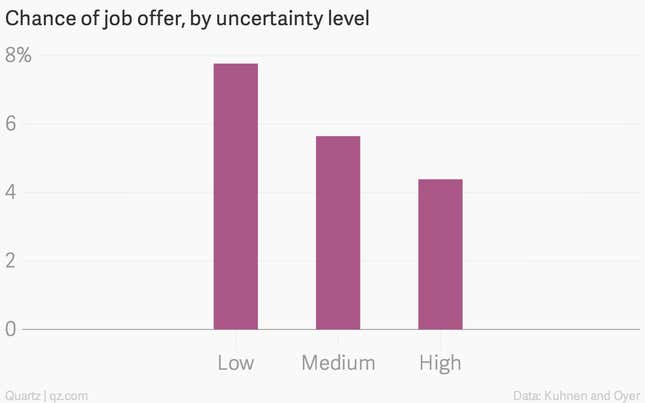It’s difficult to tell from an application or interview if somebody will succeed, so firms often default to referrals and direct industry experience. They want to reduce uncertainty any way they can, and the way it plays out in the job market places people switching industries at a big disadvantage, says a new study. Firms, particularly small and less prestigious ones, are just highly cautious.
The data, from a new NBER working paper (paywall) by UNC professor Camelia Kuhnen and Stanford’s Paul Oyer, is particularly meaningful because it comes from MBA graduates. That’s a degree that many people get explicitly to switch careers, so the fact that regardless, employers prioritize prior experience says a lot about their attitude.
In fact, employers explicitly look for certainty about productivity and fit in their new hires. The data is divided by level of uncertainty. Narrow experience in a firm’s industry indicates a low degree of uncertainty about their productivity and fit, broad experience a medium amount, and someone with no experience is labeled high. Candidates without fairly narrow industry experience lose out:

Put another way, here are the odds when you compare applicant types against each other. A score of “1” would indicate no preference for one type versus the other:

In situations where the cost of firing somebody or hiring a replacement is higher, things get even tougher for job switchers. A low-prestige firm is more than twice as likely (2.58 times) to make an offer to a candidate with industry experience, compared to 1.57 times at a prestigious one. Better known firms are much more likely to take a risk. One reason: They have a steady flow of applicants.
All firms take more chances at the internship stage because the cost of letting someone go is low compared to a full time hire. (And student GPAs didn’t make much of a difference.) When you limit the data to the tougher full time stage (netting out internship offers), a low uncertainty candidate has a massive 3.57 times bigger chance of getting an offer at a low prestige firm. It’s only 1.74 at a prestigious firm.
High firing and replacement costs mean a great deal. Small firms and those in less competitive industries (who have the luxury of choice) also place a bigger negative emphasis on uncertainty.
There’s a chance that this is a particular idiosyncrasy of the MBA market, that these are expensive hires that firms treat more cautiously.
But if even people getting a degree that caters to job switchers have trouble, it’s clear that those looking to swap careers have to make quite a convincing case to potential employers.




